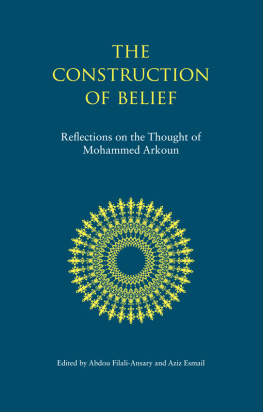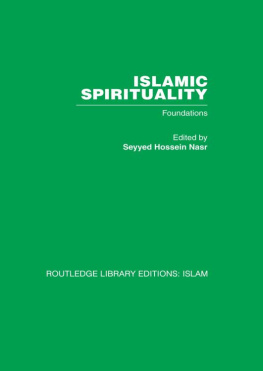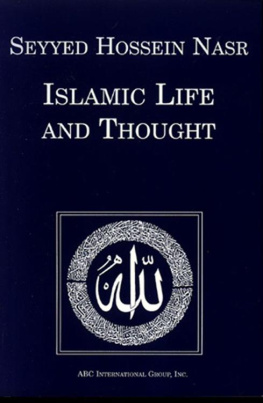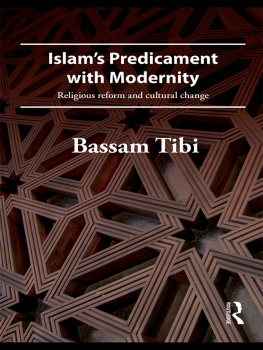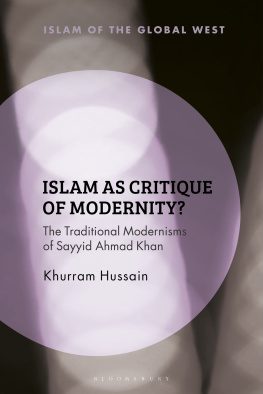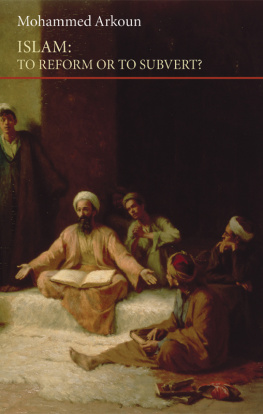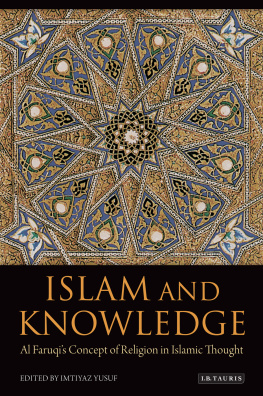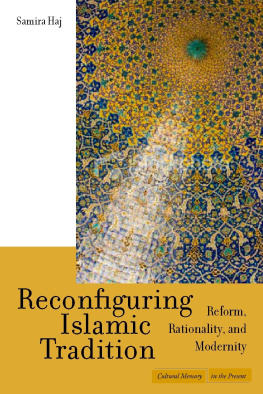
Islamic Ethos and the Specter of Modernity
ANTHEM MIDDLE EAST STUDIES
The Anthem Middle East Studies series is committed to offering to our global audience the finest scholarship on the Middle East across the spectrum of academic disciplines. The twin goals of our rigorous editorial and production standards will be to bring original scholarship to the shelves and digital collections of academic libraries worldwide, and, to cultivate accessible studies for university students and other sophisticated readers.
Series Editor
Camron Michael Amin University of Michigan-Dearborn, USA
Editorial Board
Benjamin Fortna School of Oriental and African Studies, UK
John Meloy American University of Beirut, Lebanon
Lisa Pollard University of North Carolina at Wilmington, USA
Mark L. Stein Muhlenberg College, USA
Rene Worringer University of Guelph, Canada
KEY ISSUES IN MODERN SOCIOLOGY
Anthems Key Issues in Modern Sociology series publishes scholarly texts by leading social theorists that give an accessible exposition of the major structural changes in modern societies. These volumes address an academic audience through their relevance and scholarly quality, and connect sociological thought to public issues. The series covers both substantive and theoretical topics, as well as addressing the works of major modern sociologists. The series emphasis is on modern developments in sociology with relevance to contemporary issues such as globalization, warfare, citizenship, human rights, environmental crises, demographic change, religion, postsecularism and civil conflict.
Series Editor
Bryan S. Turner City University of New York, USA, and
Australian Catholic University, Australia
Editorial Board
Thomas Cushman Wellesley College, USA
Rob Stones University of Western Sydney, Australia
Richard Swedberg Cornell University, USA
Stephen Turner University of South Florida, USA
Darin Weinberg University of Cambridge, UK
Islamic Ethos and the Specter
of Modernity
Farzin Vahdat
Anthem Press
An imprint of Wimbledon Publishing Company
www.anthempress.com
This edition first published in UK and USA 2015
by ANTHEM PRESS
7576 Blackfriars Road, London SE1 8HA, UK
or PO Box 9779, London SW19 7ZG, UK
and
244 Madison Ave #116, New York, NY 10016, USA
Copyright Farzin Vahdat 2015
The author asserts the moral right to be identified as the author of this work.
All rights reserved. Without limiting the rights under copyright reserved above, no part of this publication may be reproduced, stored or introduced into a retrieval system, or transmitted, in any form or by any means (electronic, mechanical, photocopying, recording or otherwise), without the prior written permission of both the copyright owner and the above publisher of this book.
British Library Cataloguing-in-Publication Data
A catalogue record for this book is available from the British Library.
Library of Congress Cataloging-in-Publication Data
Vahdat, Farzin.
Islamic ethos and the specter of modernity / Farzin Vahdat.
pages cm. (Anthem Middle East studies)
Includes bibliographical references and index.
ISBN 978-1-78308-436-4 (hardback : alk. paper) ISBN
978-1-78308-437-1 (pbk. : alk. paper) ISBN 978-1-78308-438-8 (pdf
ebook) ISBN 978-1-78308-439-5 (epub)
1. Islam21st century. 2. Islam20th century. 3. Muslim
scholars20th centuryBiography. I. Title.
BP161.3.V343 2015
297.0904dc23
2015002654
ISBN-13: 978 1 78308 436 4 (Hbk)
ISBN-10: 1 78308 436 7 (Hbk)
ISBN-13: 978 1 78308 437 1 (Pbk)
ISBN-10: 1 78308 437 5 (Pbk)
Cover image copyright ZouZou /shutterstock.com
This title is also available as an ebook.
ACKNOWLEDGMENTS
In the process of writing this book, I have benefited from many people. I am especially thankful to Bryan S. Turner for his support in this project. Ali Gheissari read several chapters of this book and provided me with very helpful insights. I greatly appreciate his friendship and his input. In writing this book I have received encouragement, support and comments from many friends. I thank Roy Mottahedeh, Houchang Chehabi, Ramin Jahanbegloo, Abbas Amant, Mohamad Tavakoli-Targhi, Touraj Atabaki and Afshin Matin-Asgari, among many, who gave me moral and intellectual support in this and other projects. I have learned and benefited from my friendships with Shahla Haeri and Valentine Moghadam. I am also thankful to the staff at Anthem Press, Tej Sood, Brian Stone and Lori Martinsek, for their cooperation and teamwork.
A NOTE ON TRANSLITERATION
I have transliterated Persian and most Perso-Arabic terms in the Persian style. If I determined a Perso-Arabic term possesses a more Arabic sense, I have used the Arabic style. For Arabic terms, I have used the Arabic style.
INTRODUCTION
There are compelling reasons as to why the binary question of Islam and modernity constitutes one of the major issues that the contemporary world faces today. Islam, as a world religion, has shaped the lives and consciousnesses of a large segment of humanity for centuries and created a world civilization that runs in many ways parallel to Western civilization. The rise of social and political movements in the Islamic world in the past few decades is in many ways a response to the negative forces of modernity, such as colonialism and the related problems of economic and political development. At the same time these movements are, in one way or another, faced with new ideas and institutions such as individual and citizenship rights, political participation by the populace, gender equality, economic development and tolerance of difference. The emergence of Islamic movements in the 20th century has been marked, on the one hand, by militant action and reaction against the colonial legacy that is often marred by fanaticism, xenophobia and misogyny. On the other hand, these movements have called for the mobilization of the masses and large-scale political and social participation of the populace in some parts of the Islamic world. The actions and reactions against modern colonialism (e.g., the formation of Muslim Brotherhood in early 20th century Egypt and the 1979 Islamic revolution in Iran) inspired by Islam, or more accurately by interpretations of Islam, and the responses from the West, have created volatile situations in many parts of the world. Simultaneously, the galvanization and mobilization of the masses in these parts of the world by Islamic movements have the potential to forge the foundations of mass democracy. Once a population has been mobilized and encouraged to participate in the social and political affairs of its community, it is probable for it to develop a sense of agency and feel entitled to determine its own affairs, which constitutes the foundation of mass democracy and creation of a public sphere in which individuals have the equal right to discuss and determine their communitys political and social issues. The role of Islam, or in fact interpretations of Islam, has been crucial to this process. Islamic political movements in Egypt, Pakistan and Iran, to mention a few, have all been based on interpretations of Islamic foundational sources such as the Quran, the Hadith, the Sufi traditions and sometimes Islamic philosophy and theology. At the same time, these movements and their ideological foundations have been in many ways embedded and articulated in the context of the forces and conditions of the modern world. Thus, in order to understand the contemporary Islamic movements and the consciousness of the millions of Muslims involved in or affected by these movements, it is necessary to study the complex relationships between contemporary readings of Islam and modernity in various Islamic social contexts.


